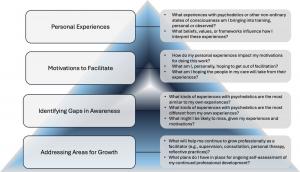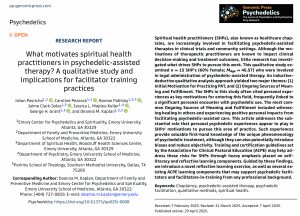Spiritual health practitioners reveal key motivations in psychedelic-assisted therapy practice
New research reveals that spiritual health professionals engaged in psychedelic-assisted therapy are often motivated by their own experiences with psychedelics
As psychedelic treatments gain traction for conditions like treatment-resistant depression, PTSD, and existential distress among cancer patients, understanding what motivates practitioners has become increasingly crucial. The qualitative study, led by Drs. Caroline Peacock, Deanna Kaplan and colleagues at the Emory Center for Psychedelics and Spirituality, highlights the substantial role that personal psychedelic experiences play in drawing healthcare chaplains to this emerging practice area.
"This research addresses fundamental questions about best practices in facilitator training that have been largely unexplored until now," says Dr. Kaplan, corresponding author and assistant professor at Emory University School of Medicine. "We found that personal experiences with psychedelics often serve as a catalyst for chaplains entering this field. The degree to which this work is deeply personal for facilitators presents unique benefits and potential challenges in therapeutic contexts."
Personal Experience as Primary Motivator
The study, led by Dr. Caroline Peacock, DMin, examined 15 spiritual health practitioners with experience facilitating legal psychedelic sessions. Researchers identified two overarching themes: initial motivations for entering the field and ongoing sources of meaning that sustain practitioners' commitment to the work.
Notably, the most frequently cited initial motivation was practitioners' own healing experiences with psychedelics. One participant described finding unexpected relief from chronic pain: "Through this work, I was able to release it. I started to feel better in every way." Others reported transformative spiritual experiences that fundamentally altered their worldview and vocational trajectory.
These findings raise intriguing questions about the relationship between personal experience and therapeutic effectiveness. Could firsthand knowledge of altered states of consciousness enhance a practitioner's ability to support others through similar experiences? How might training programs acknowledge personal experience while ensuring objective, patient-centered care?
The Double-Edged Sword of Personal Experience
The study reveals a potential tension in psychedelic facilitation practice. On one hand, experiential knowledge equips practitioners with invaluable insight into the unique phenomenology of psychedelic journeys. On the other, personal experiences can potentially introduce biases that influence clinical objectivity.
"SHPs who have experienced personal healing through psychedelics often describe a deep sense of meaning in guiding others through similar processes," Dr. Kaplan explains. "However, this raises the risk of what we term 'experiential encapsulation' – assuming one's own psychedelic experiences and interpretative frameworks are universally applicable."
This concept parallels "cultural encapsulation," where clinicians unconsciously impose their own cultural frameworks on diverse clients. In the psychedelic context, practitioners might similarly project their expectations onto patients whose experiences differ significantly from their own.
A Novel Approach to Facilitator Training
The research team introduces a structured self-literacy reflection exercise designed to help psychedelic facilitators develop awareness of their motivations and what they may be likely to overlook, as a result of personal experience. The exercise guides practitioners through exploration of four key areas: personal experiences, motivations to facilitate, identifying gaps in awareness, and addressing areas for growth.
"We found that training models from the Association for Clinical Pastoral Education (ACPE), which emphasize self-literacy and reflective learning, offer valuable frameworks for psychedelic facilitator training across disciplines," notes Dr. Peacock, who is a trained psychedelic-assisted therapy facilitator and Director of Care Transformation for Emory Spiritual Health. "These approaches help practitioners balance the value of personal experience with the need for clinical objectivity."
The reflective exercise poses questions like: "What experiences with psychedelics am I bringing into training?" and "What might I be likely to miss, given my experiences and motivations?" Such questions aim to enhance facilitator effectiveness by increasing awareness of potential biases.
Implications for an Emerging Field
As legal frameworks for supervised psychedelic use expand in states like Oregon and Colorado, and with FDA approval of certain psychedelic compounds potentially on the horizon, optimizing facilitator training has become increasingly urgent. The study suggests that acknowledging personal psychedelic experiences as motivational factors – rather than debating whether such experiences should be prerequisites for practice – may be a more productive approach to training.
Dr. Roman Palitsky, assistant professor of Psychiatry at Emory and co-author of the study, explains: “It is unclear whether having firsthand experience with psychedelics makes someone a better facilitator. Our findings suggest that, even if prior psychedelic use by facilitators is linked to better patient outcomes, that connection could be explained by heightened motivation and not special insights or skills that come from personal psychedelic use. That’s why we recommend that training programs help future facilitators understand their motivations. It is a very important part of preparation for providing this type of care.”
This research arrives at a critical juncture for psychedelic medicine. With mounting evidence supporting PAT's effectiveness for various mental health conditions, attention has shifted to understanding how facilitator attributes influence therapeutic outcomes. What qualities make an effective PAT facilitator? How can training programs best prepare practitioners for this unique therapeutic modality?
Dr. Roman Palitsky adds, "PAT involves intense phenomenological experiences that can last many hours and sometimes lead to changes in patients' worldviews. Understanding facilitator motivations helps us develop training that prepares practitioners for these unique qualities."
Sustainability in a Challenging Field
The study also identifies factors that sustain practitioners' ongoing commitment to psychedelic care. Many reported finding fulfillment in witnessing healing in others, experiencing mutuality with clients, and appreciating patterns commonly associated with psychedelic experiences, such as interconnectedness.
One participant described this sustaining factor: "Seeing the similar experiences of participants in studies... creating new stories but also coming into a sense of being part of something larger... that to me is spiritual however anyone defines their spiritual journey."
Understanding these motivating factors not only informs training but may also help address sustainability in a field that can be emotionally demanding. How might ongoing education incorporate reflective practices that sustain practitioners' resilience and effectiveness?
This research represents a pivotal step toward developing evidence-based training protocols for psychedelic facilitators. By examining the personal and professional factors that draw spiritual health professionals to this work, it offers insights relevant to practitioners from all disciplines engaged in psychedelic care.
Says Dr. Kaplan, “Psychedelic facilitation is drawing care professionals from many fields, such as clinical psychology, psychiatry, counseling, and social work. Reflective practice is a core part of training in some professions, but not all. This study highlights just how valuable spiritual health professionals are on psychedelic care teams. It also challenges us to think about how chaplaincy training practices, like reflective learning, could benefit all psychedelic facilitators, no matter their original professional background."
The findings suggest that training programs should acknowledge the role of personal experiences while emphasizing self-awareness and ethical practice. Could such approaches be integrated into certification programs across disciplines? How might interdisciplinary teams leverage the unique strengths of chaplains and other healthcare providers in psychedelic care?
As psychedelic medicine continues to evolve, understanding the human factors that shape care delivery will remain crucial. This study provides a foundation for future research examining how facilitator attributes influence therapeutic relationships and outcomes in PAT.
The article in Psychedelics titled "What motivates spiritual health practitioners in psychedelic-assisted therapy? A qualitative study and implications for facilitator training practices," is freely available available via Open Access on 29 April 2025 in Psychedelics at the following hyperlink: https://doi.org/10.61373/pp025r.0008.
"About Psychedelics: Psychedelics: The Journal of Psychedelic and Psychoactive Drug Research (ISSN: 2997-2671, online and 2997-268X, print) is a high-quality medical research journal published by Genomic Press, New York. Psychedelics is dedicated to advancing knowledge across the full spectrum of consciousness altering substances, from classical psychedelics to stimulants, cannabinoids, entactogens, dissociatives, plant derived compounds, and novel compounds including drug discovery approaches. Our multidisciplinary approach encompasses molecular mechanisms, therapeutic applications, neuroscientific discoveries, and sociocultural analyses. We welcome diverse methodologies and perspectives from fundamental pharmacology and clinical studies to psychological investigations and societal-historical contexts that enhance our understanding of how these substances interact with human biology, psychology, and society.
Visit the Genomic Press Virtual Library: https://issues.genomicpress.com/bookcase/gtvov/
Our full website is: https://genomicpress.kglmeridian.com/
Ma-Li Wong
Genomic Press
mali.wong|genomicpress.com| |mali.wong|genomicpress.com
Visit us on social media:
LinkedIn
Bluesky
Instagram
Facebook
Legal Disclaimer:
EIN Presswire provides this news content "as is" without warranty of any kind. We do not accept any responsibility or liability for the accuracy, content, images, videos, licenses, completeness, legality, or reliability of the information contained in this article. If you have any complaints or copyright issues related to this article, kindly contact the author above.
Pay It Forward 9/11 Hosts The Great Gander Getaway Giveaway
'AI Receptionists Are Now Booking Jobs Better Than Humans,' says Australian Start-Up
MindStir Media Wins Silver in the Publishing Category at the 2025 Titan Business Awards
Kalendarium
Więcej ważnych informacji
 Jedynka Newserii
Jedynka Newserii

 Jedynka Newserii
Jedynka Newserii

Ochrona środowiska

Z powodu braku przejrzystego prawa branża recyklingu odkłada inwestycje. Firmy apelują o szybkie wdrożenie przepisów
Branża recyklingu stoi przed wyzwaniami związanymi z wdrożeniem systemu kaucyjnego, systemu rozszerzonej odpowiedzialności producenta i rozporządzenia PPWR. Brakuje jednak odpowiednich przepisów dostosowujących polskie prawo i realia do unijnych regulacji. W efekcie utrzymującej się niepewności prawnej między 2018 a 2023 rokiem co trzeci zakład recyklingu zamknął działalność. Wiele firm odkłada inwestycje, czekając na uregulowanie rynku. Podobna niepewność dotyczy też producentów opakowań.
Transport
Testowanie pojazdów zautomatyzowanych wkrótce będzie możliwe. To odpowiedź na postulaty przedsiębiorców

Kończą się prace nad przepisami, które mają usprawnić prace badawcze nad pojazdami zautomatyzowanymi. Ma to być odpowiedź na postulaty przedsiębiorców, którzy wskazywali na potrzebę pilnej zmiany przepisów w zakresie testowania pojazdów autonomicznych. Obecne regulacje nie sprzyjają postępowi technologicznemu i rozwoju autonomiczności pojazdów, o czym świadczy bardzo niewielka liczba wydanych uprawnień do ich prowadzenia.
Firma
Przedsiębiorcom coraz bardziej doskwiera niestabilność i skomplikowanie przepisów podatkowych. Problemem są też niejasne ich interpretacje

Polscy przedsiębiorcy często negatywnie oceniają jakość przepisów podatkowych – wynika z raportu „Przedsiębiorcy pod lupą fiskusa 2025” przygotowanego przez firmę doradztwa podatkowego MDDP we współpracy z Konfederacją Lewiatan. Ich niepokój budzą niejednolite interpretacje przepisów i niepewność prawa podatkowego, które cały czas jest modyfikowane. Wśród kluczowych zmian w obszarze podatków, które będą dotyczyć praktycznie wszystkich przedsiębiorców, są m.in. wprowadzenie Krajowego Systemu e-Faktur czy zmiany w podatku od nieruchomości.
Partner serwisu
Szkolenia

Akademia Newserii
Akademia Newserii to projekt, w ramach którego najlepsi polscy dziennikarze biznesowi, giełdowi oraz lifestylowi, a także szkoleniowcy z wieloletnim doświadczeniem dzielą się swoją wiedzą nt. pracy z mediami.










.gif)

 |
| |
| |
|